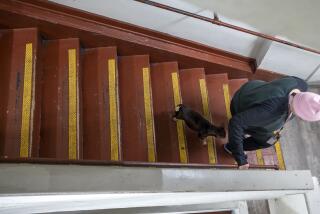House of Compassion for AIDS Patients Finds Trait Lacking in Neighbors : Rhode Island: Home has faced opposition from the beginning. Some neighbors say death could be disturbing to children. Others fear the disease could somehow be spread through the sewers.
- Share via
CUMBERLAND, R.I. — The House of Compassion is a field of war.
It’s just a three-story, yellow house. But four people who live there have AIDS, and neighbors have gone to court to get them out.
It hurts property values, they complain. It endangers the public, they say; it exposes children to an influx of coroners, ambulances and drug peddlers.
But the people inside will not go quietly.
“They’ll have to get a crowbar and pull me out, because we’re staying,” said Sara Paneto, 42, who moved into the house in December.
The house--undistinguished except for the red AIDS ribbons that hang from the mailbox and nearly every tree--is the brainchild of Colleen Scanlan, who had worked with AIDS patients at a clinic.
For $350 a month, residents receive room and board. More important, they receive the emotional support of their housemates. A volunteer coordinates some group activities, such as outings to the movies and restaurants. Counselors visit from time to time, and nurses come to the house as well.
From the start, Scanlan faced opposition in the upper middle class neighborhood. One day, after word spread of her plans, she went outside to find the paint on her car had been scratched and a tire punctured.
She was called to a meeting with neighbors in July, and later before the Cumberland Town Council, where 200 people peppered a panel of medical experts with questions. She was accused of lacking compassion for people who do not have AIDS.
“I felt sad because I had worked in the field and I had known what people with AIDS go through,” said Scanlan.
Some worried that a sewer backup could flood their lawns with HIV-infected waste, although the virus generally does not live outside the human body and medical wastes are picked up by a hazardous waste company.
Some neighbors said the house could be emotionally disturbing to children who live nearby, while others feared it would draw drug pushers because HIV can be spread among drug users by the sharing of hypodermic needles.
“There was anger there, but I felt the anger was actually masked fear,” Scanlan said.
She pushed ahead. The Cumberland Zoning Board ruled that the home could be located in the residential neighborhood, but opponents were not appeased. Scanlan learned a collection was being taken to pay legal fees to fight the house, and a petition was being circulated among neighbors.
The petition listed 10 reasons the house should not be allowed to remain in the neighborhood, Scanlan said. Among them: It would decrease property values by 40%, hurt impressionable schoolchildren and increase the crime rate.
The first residents moved in at the beginning of December.
Among them was Jeffrey Hall, a 34-year-old former power lifter. On World AIDS Day--Dec. 1--Hall was lonely and depressed, afraid of dying in “a suffering way.” So he swallowed 65 pills.
“I thought I’d take the pills and go to sleep instead of laying there rotting away and dealing with the pain,” he said.
The pills did not rescue him. But he says the House of Compassion did--he moved in four days later, on Dec. 5.
“Coming here changed me instantly,” he said. “With AIDS, depression is a big killer. If you’re alone, you tend to think about your problems more. Here, there is love and compassion.”
But those rosy sentiments are not shared by neighbors who “think the zoning ordinance precludes a home of this nature in a residential zone. Any community home,” said lawyer Francis Gaschen, who filed suit on their behalf.
Scanlan said the controversy seemed to die and the residents began to feel accepted when they were flooded with Christmas presents and donations of food that filled the pantry. Most came from outside the neighborhood, however.
“At Christmas you couldn’t see half the tree for all the presents brought in for the residents. . . . But then two days after Christmas, we learned of the civil suit,” she said.
More to Read
Sign up for Essential California
The most important California stories and recommendations in your inbox every morning.
You may occasionally receive promotional content from the Los Angeles Times.













